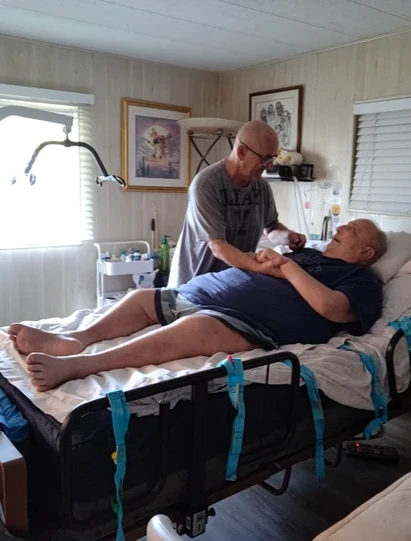
In 2019, Wayne, now 70 years old, had an accident that resulted in paralysis from the neck down. He is in a wheelchair, has mild cognitive impairment as a result of the fall, and requires personal care services 24 hours a day. After his accident, Wayne was found eligible for Florida’s Medicaid Long Term Care (LTC) program. Enrollment in this program made it possible for him to receive the home health care he needs in order to avoid institutionalization. He needs to be lifted and moved multiple times a day to prevent infections, and requires assistance for eating and all activities of daily living. Wayne’s Medicare does not cover the personal care services that the LTC Medicaid program provides.
Although his financial situation had not changed since he first enrolled in Medicaid in 2019, Wayne received a notice from the Florida Department of Children and Families (DCF) in September 2023 telling him that his Medicaid was being terminated. The reason given in the notice was: “YOU OR A MEMBER(S) OF YOUR HOUSEHOLD REMAIN ELIGIBLE FOR MEDICAID UNDER A DIFFERENT MEDICAID COVERAGE GROUP.”
“Wayne and his husband and caretaker Kris did not understand what other “coverage group” Wayne could be receiving Medicaid under. They could not think of any reason or any change in their circumstances that would lead to Wayne’s Medicaid being terminated.”
They contacted the case manager from Wayne’s Long Term Care plan, but the case manager did not provide any additional information about why his Medicaid was being terminated, or what he could do to fix the problem. They contacted DCF, but no one could explain what happened or changed that led to notice of termination of his Medicaid.
Wayne and Kris were terrified that Wayne was suddenly going to be left without the healthcare he needed. Unclear of what to do, they contacted the Florida Health Justice Project (FHJP). FHJP advised them how to appeal before the termination date. Under Medicaid law, this ensured that his Medicaid would remain in place while the appeal was pending. FHJP helped them navigate the appeal process, and integrated some of what we learned together in FHJP’s Appeal Toolkit, now in its second edition.
After filing a pre termination appeal, Wayne received a notice that he was” eligible for Medicaid.” But it was unclear if DCF had decided the prior notice of termination was erroneous, and that he was, in fact, entitled to ongoing coverage through the Long Term Care Medicaid program. FHJP cautioned Wayne that this notice might only mean that he would continue to receive Medicaid while his appeal was pending, which, again, is a requirement under the law and that he should not withdraw his appeal until ongoing coverage was confirmed. It was impossible to get an answer from DCF. Even with an appeal pending, Wayne never received information from DCF about why his Medicaid was terminated or a copy of his DCF case file so his documents could be reviewed to determine why he received a notice of termination.
Finally, FHJP was able to contact an attorney from DCF and confirm that Wayne’s Medicaid had been renewed for the next year. However, Wayne never found out why he had been sent a notice of termination in September and cannot help but worry that this problem will repeat itself in the future.

Florida Health Justice Project engages in comprehensive advocacy to expand health care access and promote health equity for vulnerable Floridians.
A copy of the official registration and financial information may be obtained from the division of consumer services by calling 1-800-HELP-FLA (435-7352) toll-free within the state. Registration does not imply endorsement, approval, or recommendation by the state.